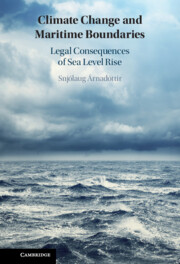Book contents
- Climate Change and Maritime Boundaries
- Climate Change and Maritime Boundaries
- Copyright page
- Contents
- Acknowledgements
- Table of Cases
- Table of Treaties and Legislation
- Abbreviations
- Introduction
- 1 Law of the Sea and the Changing Marine Environment
- 2 Unilaterally Declared Maritime Limits
- 3 Maritime Delimitation and Coastal Instability
- 4 Maritime Delimitation and the Marine Environment
- 5 Fundamental Change of Circumstances
- Conclusion
- Bibliography
- Index
5 - Fundamental Change of Circumstances
Published online by Cambridge University Press: 02 December 2021
- Climate Change and Maritime Boundaries
- Climate Change and Maritime Boundaries
- Copyright page
- Contents
- Acknowledgements
- Table of Cases
- Table of Treaties and Legislation
- Abbreviations
- Introduction
- 1 Law of the Sea and the Changing Marine Environment
- 2 Unilaterally Declared Maritime Limits
- 3 Maritime Delimitation and Coastal Instability
- 4 Maritime Delimitation and the Marine Environment
- 5 Fundamental Change of Circumstances
- Conclusion
- Bibliography
- Index
Summary
Treaties rely on the assumption that certain circumstances, essential to the conclusion of the treaty, will remain unchanged. It is on the basis of those circumstances that parties reach an agreement and pacta sunt servanda aims to safeguard those shared expectations. Still, States can be freed from their contractual obligations through peaceful means, when circumstances leading to the conclusion of a treaty change and obligations under a treaty become unduly burdensome. An unforeseen fundamental change of circumstances can be invoked as grounds for terminating a treaty if it affects the essential basis of the treaty and radically transforms obligations still to be performed. These conditions can all be met when coastlines or ecological circumstances undergo fundamental changes, affecting the essential basis of maritime delimitation agreements or related agreements concerning resource management. However, treaties establishing boundaries are immune from termination or revision on these grounds. Still, such agreements can be reinterpreted as a result of fundamental, environmental changes and this exception arguably, only excludes maritime boundaries of the territorial kind.
Keywords
- Type
- Chapter
- Information
- Climate Change and Maritime BoundariesLegal Consequences of Sea Level Rise, pp. 168 - 219Publisher: Cambridge University PressPrint publication year: 2021

